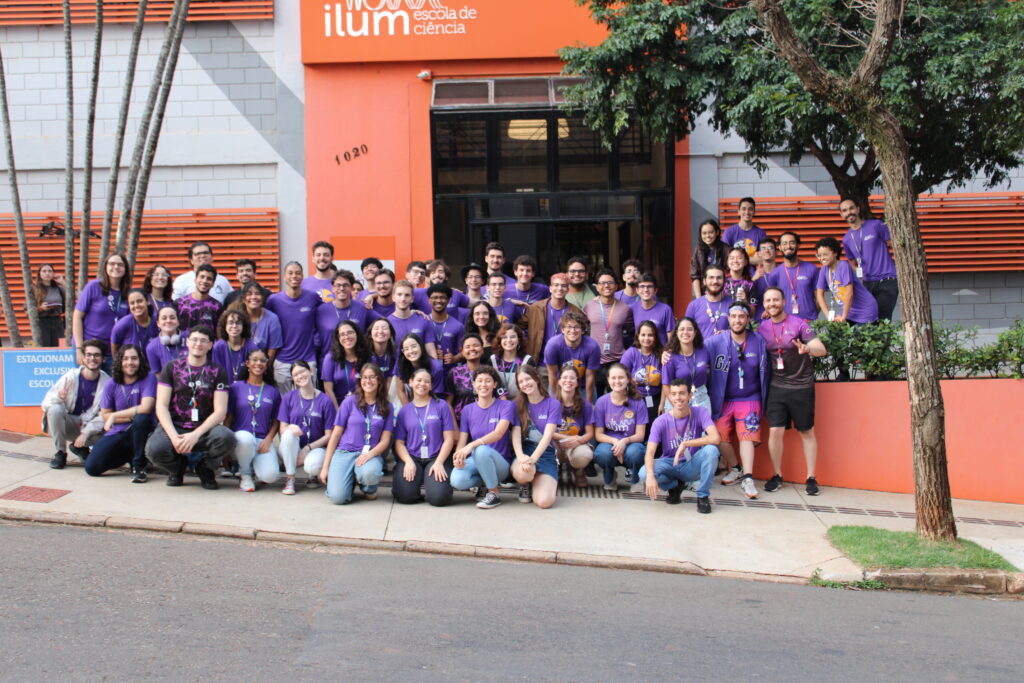Last Saturday (4), Ilum School of Science, the higher education program of the Brazilian Center for Research in Energy and Materials (CNPEM), opened its doors to the community for another edition of the Ilum Open House (IPA). The annual event brought together dozens of visitors in Campinas and provided an immersion into the world of science, technology, and innovation through hands-on activities, interactive experiments, and research presentations.
Organized by the students of the Bachelor’s degree in Science and Technology, the IPA is a space where theory and practice meet. There were 16 main attractions, including experiments on nanotechnology, biology, artificial intelligence, electricity and climate change, as well as a poster session featuring 8 scientific initiation works and research projects developed by undergraduate students.

Among the visitors was the Dantas family, who traveled from Rio de Janeiro especially to learn about the School’s pedagogical proposal. Young Danilo Costa Silva Dantas was impressed by the laboratories and has already signed up for the 2026 selection process. “I wanted to get to know the infrastructure. I really enjoyed the visit, especially the laboratories”, he says. His father, Rodrigo Calixto Dantas, highlighted the experience’s impact: “I was delighted with the School. After the event, it was possible to get an idea of what the students do. It made us happy and, who knows, maybe Danilo will get a place here.”
Another future candidate, Giovani Alcaraz Gomes, was also present. About to complete a technical course in Systems Development, he highlighted his interest in projects in the area of Data Science. “I think the work is really cool. If I am accepted into Ilum, it would be great to learn more about science and contribute to the future of computing”, he says.
In addition to academic activities, the event promoted moments of exchange between students, professors, visitors, and family members, strengthening Ilum’s mission of training scientists prepared to work in different areas of knowledge, always with a critical and collaborative approach.
2026 Selection Process open for applications
Applications for the selection of the 40 students who will join Ilum in 2026 are open until December 15th. The selection process for the Science and Technology undergraduate course has three stages: filling out the registration form, Enem score, which selects the 250 best ranked, and individual interviews of those selected with the Ilum evaluation committee. It is worth remembering that half of the places are reserved for students from public schools across the country.
In addition to three years of free, comprehensive education, including access to CNPEM’s cutting-edge laboratories, successful candidates also receive housing, meals, transportation, a laptop, English classes, and psychological support throughout their studies.
About the Ilum School of Science
Ilum offers a free undergraduate degree program that utilizes an interdisciplinary approach to train scientists and professionals in science and technology. With an innovative educational model, the three-year full-time bachelor program offers courses that connect life sciences, materials science, data science, artificial intelligence, and the humanities in order to prepare researchers to work in an ethical and collaborative manner in the search for solutions to the global challenges of the twenty-first century. The Ilum School of Science is funded by the Brazilian Ministry of Education (MEC) and is part of the Brazilian Center for Research in Energy and Materials (CNPEM) in Campinas, São Paulo, a social organization overseen by the Ministry of Science, Technology, and Innovation (MCTI). Ilum’s educational mission offers early contact with experimental activities, in teaching labs at the school as well as at CNPEM, in projects carried out together with researchers.
About CNPEM
The Brazilian Center for Research in Energy and Materials (CNPEM) is home to a state-of-the-art, multi-user and multidisciplinary scientific environment and works on different fronts within the Brazilian National System for Science, Technology and Innovation. A social organization overseen by the Ministry of Science, Technology and Innovation (MCTI), CNPEM is driven by research that impacts the areas of health, energy, renewable materials, and sustainability. It is responsible for Sirius, the largest assembly of scientific equipment constructed in the country, and is currently constructing Project Orion, a laboratory complex for advanced pathogen research. Highly specialized science and engineering teams, sophisticated infrastructure open to the scientific community, strategic lines of investigation, innovative projects involving the productive sector, and training for researchers and students are the pillars of this institution that is unique in Brazil and able to serve as a bridge between knowledge and innovation. CNPEM’s research and development activities are carried out through its four National Laboratories: Synchrotron Light (LNLS), Biosciences (LNBio), Nanotechnology (LNNano), Biorenewables (LNBR), as well as its Technology Unit (DAT) and the Ilum School of Science — an undergraduate program in Science and Technology supported by the Ministry of Education (MEC).






